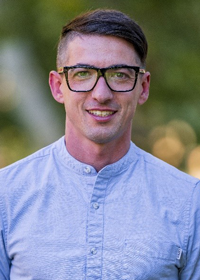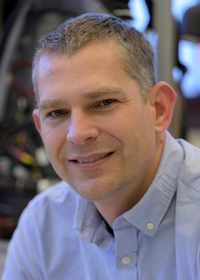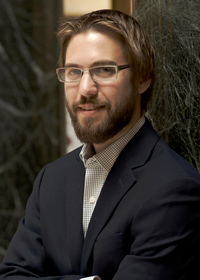Session Organizer: Holly Golecki, University of Illinois at Urbana-Champaign
Session Co-Organizer: Andrew Hansen, Minneapolis VA Health Care System
In this session, presenters will discuss their efforts in human-robot interactions for rehabilitation devices.
A Lightweight Robotic Leg Prosthesis Replicating the Biomechanics of the Knee, Ankle, and Toe Joint

Tommaso Lenzi
Associate Professor, Mechanical Engineering, University of Utah
Abstract: In this talk, I will present a robotic leg prosthesis that replicates the key biomechanical functions of the biological knee, ankle, and toe in the sagittal plane while matching the weight, size, and battery life of conventional microprocessor-controlled prostheses. The powered knee joint uses a unique torque-sensitive mechanism combining the benefits of elastic actuators with that of variable transmissions. A single actuator powers the ankle and toe joints through a compliant, underactuated mechanism. A prosthesis with these characteristics has the potential to improve real-world mobility in individuals with above-knee amputation.
Because the biological toe dissipates energy while the biological ankle injects energy into the gait cycle, this underactuated system regenerates substantial mechanical energy and replicates the key biomechanical functions of the ankle/foot complex during walking. A compact prosthesis frame encloses all mechanical and electrical components for increased robustness and efficiency. Preclinical tests with three individuals with above-knee amputation show that the proposed robotic leg prosthesis allows for common ambulation activities with close to normative kinematics and kinetics. Using an optional passive mode, users can walk on level ground indefinitely without charging the battery, which has not been shown with any other powered or microprocessor-controlled prostheses. A prosthesis with these characteristics has the potential to improve real-world mobility in individuals with above-knee amputation.
Bio: Tommaso Lenzi is an Associate Professor in the Department of Mechanical Engineering at the University of Utah and a core faculty member in the Utah Robotics Center. At Utah, he directs the HGN Lab for Bionic Engineering and the Ergonomics and Safety Program of the Rocky Mountain Center for Occupational and Environmental Health.
Design and Simulation of Physical Human-Robot Systems

Frank Sup IV
Associate Professor, University of Massachusetts Amherst
Abstract: The task of designing, controlling, and optimizing physical human-robot systems to achieve desired performance goals is complex, as it involves dealing with the constraints and complexity of both the human and the robot, as well as the interface between them. In this talk, the speaker will discuss the usefulness of biomechatronic simulations in creating coupled human-robot systems. Examples of prostheses and augmentation devices will demonstrate how design choices can be made to help achieve the coupled human-robot system performance goals.
Bio: Frank Sup, PhD, is an Associate Professor of Mechanical and Industrial Engineering at the University of Massachusetts Amherst. He directs the Mechatronics and Robotics Research Lab and co-directs the Elaine Marieb Center for Nursing and Engineering Innovation. He focuses on developing human-centered mechatronic technologies to augment human performance and exploring the design and control space to enable robots to fluently interact with humans.
Garment-Based Technologies for Rehabilitation Applications

Brad Holschuh
University of Minnesota
Dr. Brad Holschuh is an Associate Professor of Apparel Design at the University of Minnesota, where he also serves as Director of Graduate Studies for the Human Factors and Ergonomics (HFE) program, and Co-Director of the Wearable Technology Laboratory (WTL). He earned his BS ('07), dual MS ('10), and PhD ('14) degrees from the Massachusetts Institute of Technology. Dr. Holschuh’s research focuses on the use of wearable technology to improve human performance both in space and on Earth, with a specific focus on integrating active materials technology into wearable systems. His work encompasses wearable technology, soft robotics, human factors design, textile engineering, aerospace engineering and bioastronautics, and materials science.
Session Organizer Bios
Andrew Hansen, Professor, Rehabilitation Science & Biomedical Engineering; Research Biomedical Engineer, Minneapolis VA Health Care System
Andrew is a founder and the director of the Minneapolis Adaptive Design & Engineering (MADE) Program at the Minneapolis VA Health Care System. He is also a Professor of Rehabilitation Science & Biomedical Engineering at the University of Minnesota.